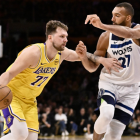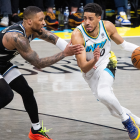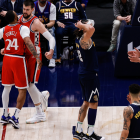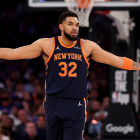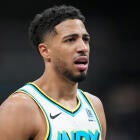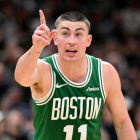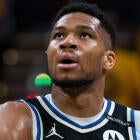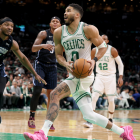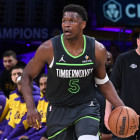Despite the protests of his most ardent supporters, Michael Jordan did not, in fact, win six championships by himself. While he hardly played in the superteam era the NBA is living through these days, his rosters were among the best the NBA had ever seen in without including his presence. Case in point: the 1993-94 Bulls went 55-27 while he was playing minor league baseball in Birmingham.
But which of those teammates truly stood out? While the top pick in any ranking of Jordan's teammates would be sadly anticlimactic, let's dive into the 23 best players No. 23 ever played with to determine just how many greats Jordan shared the court with during his legendary career.
23-22. Artis Gilmore and Robert Parish
Were either nearly as good with Jordan as they were at their peak? Absolutely not. Both Gilmore and Parish spent their final NBA seasons in Chicago (though Gilmore spent the bulk of his career there in a prior stint), and their numbers reflect their age. But having Hall of Famers has value even if it doesn't come on the court. Their resumes are enough to warrant placement on this list.
21. Sam Vincent
While Vincent's greatest contribution to the Bulls may have been his role as the inadvertent catalyst behind Jordan's brief move to point guard, he was a steady starter for Chicago early in Jordan's career. He averaged 13 points and over eight assists per game for the 1987-88 season.
20. Quinton Dailey
Dailey is largely forgotten as a casualty of Jordan's ascension, but prior to No. 23's arrival in Chicago, he was one of the only worthwhile Bulls. He averaged 16.4 points per game across four seasons in Chicago, two of which he shared with Jordan. He earned All-Rookie honors in 1983, but with Jordan in tow, Chicago had no need for a scoring shooting guard and Dailey spent the rest of his career with the SuperSonics and Clippers.
19. George Gervin
Gervin falls in a similar category as Parish and Gilmore, but he actually managed to contribute on the court for the Bulls. He averaged 16.2 points per game in his one and only season with the Bulls, but Jordan was injured for most of the 1985-86 campaign. When the two played together, his numbers declined considerably. Peak Gervin might top this entire list, but the version of him that Jordan got was only mediocre.
18. Stacey King
Although disdained by Jordan for his inconsistent conditioning, King was a valuable power forward during Chicago's first three championship runs. There was hardly anything spectacular about his game, and Chicago's decision to take him No. 6 overall over stars like Shawn Kemp and Tim Hardaway in the 1989 NBA Draft might have cost the Bulls an extra championship or two, but he provided decent scoring, rebounding and defense for parts of five seasons.
17. Craig Hodges
Hodges clashed with Jordan over his political beliefs, but he was also one of the NBA's best 3-point shooters in the late 1980s and early 1990s. He may have attempted only 2.3 3-pointers per game as a Bull, but in those days, that more than qualified him as a marksman, and he made 42.5 percent of them, providing meaningful spacing for Jordan's drives.
16. John Paxson
Paxson's numbers in Chicago were fairly underwhelming, but his clutch credentials were undeniable. Among his many big shots for the Bulls, Paxson hit the championship-clincher in Game 6 of the 1993 Finals. Of course, the Bulls would go on to pay for Paxson's success as a player by enduring nearly two decades of his poor stewardship as their top basketball decision-maker.
15. Luc Longley
Big men on Jordan teams were largely expected to do the dirty work and get out of the way, and Longley did so with aplomb. He provided solid if unspectacular defense and rebounding while also adding a measure of spacing with his solid mid-range shot. His emergence in 1994 and 1995 also paved the way for Chicago's acquisition of Dennis Rodman, as they dealt fellow center Will Perdue to get him. That doesn't hurt his case either.
14. Bison Dele
He may have spent only a few months on Jordan's team, but Bison Dele was a major addition to Chicago's 1997 championship team. He had averaged nearly 16 points per game with the Clippers a year earlier, but sat out the majority of the 1996-97 season due to a contract dispute. He eventually signed with the Bulls and played well enough to earn a $40 million contract from the Pistons that summer. His stunning retirement at the age of 30 and even more mysterious death only two years later have knocked him out of the public consciousness, but Dele was one of the better offensive forwards of his generation.
13. B.J. Armstrong
Armstrong's best basketball may have come with Jordan playing baseball, but he was critical as a secondary ball-handler during Chicago's first three championship runs, and by the time Jordan retired, he was one of the NBA's better 3-point shooters as well. Had the Bulls retained him into the second three-peat, he would likely be remembered far more fondly.
12. Ron Harper
Harper's best days as a scorer were behind him by the time he reached Chicago in 1994, but he evolved into a ferocious defender. While nominally he was Chicago's point guard, he could defend practically any perimeter opponent, giving a Chicago team that featured a number of switchable defenders unparalleled versatility. He set the template for playing off-ball point guard in the triangle offense with his impressive size and willingness to shoot from behind the arc.
11. Bill Cartwright
Another player Jordan wasn't overly fond of, Cartwright was the perfect center for Chicago's culture. While he was a top scorer earlier in his career, he grew into a solid all-around big man that played great defense and excelled as a passer in the triangle. His rebounding was problematic for the era, but his strong presence in the locker room (1988-94) was invaluable for the Bulls.
10. Steve Kerr
Evaluating Kerr fairly is almost impossible. His shooting numbers were utterly preposterous, as he made nearly 48 percent of his 3-point attempts as a Bull. But his value was derived almost entirely from that shooting, which was boosted by the NBA's decision to shorten the 3-point line from the 1994-95 season through the 1996-97 campaign. Kerr would jump even higher on this list if that change had been permanent. Without it? He'd fall behind Cartwright and Harper, and perhaps Armstrong as well.
9. Orlando Woolridge
It's largely been forgotten, but the Bulls actually had a young star when they landed Jordan. Woolridge, the No. 6 overall pick in the 1981 NBA Draft, averaged 19.3 points per game in the season before Jordan's arrival. He was just phased out by a far superior young talent. He spent only two years with Jordan, but the 22.9 points he produced per game during the 1984-85 season were ultimately the most any Jordan teammate, including Scottie Pippen, ever scored.
8. Larry Hughes
Hughes sacrificed quite a bit offensively to work alongside Jordan in Washington. His scoring dipped by over four points per game upon joining the Wizards in 2002 and grew by six after Jordan's retirement, but Hughes was the jack-of-all-trades Jordan once had in Pippen (albeit on a much lower level). Hughes gave the Wizards 12.5 points, 4.0 rebounds and 3.7 assists while playing excellent defense -- a necessity given Jordan's physical degradation in Washington.
7. Jerry Stackhouse
Jordan led his team in scoring in 15 of his 16 NBA seasons. Stackhouse is the only teammate ever to beat him (2002-03), and he did so even after significantly declining from his 29.8 points per game peak. The fit was questionable, but Stackhouse was among the NBA's best scorers when he played with Jordan. If he were a better defender, he might've landed in the top five of this list.
6. Horace Grant
Grant was everything a team could ask for in a power forward during the 1990s. He rebounded and defended at a high level, provided a measure of physicality that was sorely needed for a team that consistently went up against the "Bad Boy" Pistons, and was among the NBA's best mid-range shooters, especially for a player of his size. He was essentially the big-man equivalent of Hughes in that he did a bit of everything, but lacked a truly elite skill (though his rebounding came close).
5. Charles Oakley
Oakley wasn't quite as skilled as Grant, but his physical presence more than made up for it. Oakley was one of the NBA's best rebounders throughout his career and added solid interior scoring and defense, but his unofficial position as Jordan's enforcer was his greatest contribution to the Bulls. Anyone who fouled Jordan could expect retribution from Oakley, and it's not a coincidence that the Pistons physically bullied him in the 1989 and 1990 playoffs after he was dealt to the Knicks. He remains a close friend of Jordan's to this day, and it wasn't until their later acquisition of Dennis Rodman that the Bulls found another protector for their MVP.
4. Toni Kukoc
Kukoc was a pioneer. While Pippen is hailed as Chicago's point forward, Kukoc was a true point guard in a forward's body. He was, in essence, the perfect triangle offense player, as he shot, passed and cut at an elite level. He posted a truly impressive 19-7-5 line after Jordan retired, and if he'd played with modern spacing and creativity, he might have been an All-Star. As a supporting piece to Jordan from 1993 to 1998, he was a matchup nightmare, as he could post-up smaller guards and space opposing forwards out of the paint. He was far and away the most underappreciated Bull of the championship years, a fate Jordan contributed to. Both he and Pippen disliked Kukoc simply because Bulls GM Jerry Krause was so enamored of him. Had they been more welcoming early on, Kukoc's legacy would be entirely different.
3. Rip Hamilton
Jordan made a lot of questionable moves when he ran the Wizards, but trading Richard "Rip" Hamilton might have been his worst. Hamilton averaged 20 points alongside Jordan in the 2001-02 season, but in the following offseason he was dealt for Stackhouse, who was ostensibly in his prime. Hamilton grew into a three-time All-Star, an elite two-way guard and an NBA champion with the Pistons. The fit might not have been ideal, but Hamilton was so good that the aging Jordan should have been more accommodating. His loss was Detroit's gain.
2. Dennis Rodman
Rodman wasn't quite at his peak by the time he got to Chicago. He regularly played lazy defense in the name of maximizing his rebounding numbers, and was notoriously unreliable within locker rooms. But even in his mid-30s, he earned a First-Team All-Defense nod for the 1995-96 Bulls while also leading the league in rebounding three times and giving Chicago an edge they lacked during their first three title runs. Besides the truly washed up players at the beginning of this list, Jordan played with only two Hall of Famers in his career. Rodman is one of them, and the worthy choice as the second-best player Jordan ever played with.
1. Scottie Pippen
You were expecting someone else? Pippen is arguably the greatest perimeter defender in NBA history. He was perhaps the NBA's best passing forward during his career, and once led the Bulls in points, rebounds, assists, steals and blocks in the same season. As great as Jordan was, he doesn't come close to six championships without Pippen by his side. Had he played anywhere else, he might be remembered as one of the 10 or 15 greatest NBA players of all time.
![[object Object] Logo](https://sportshub.cbsistatic.com/i/2020/04/22/e9ceb731-8b3f-4c60-98fe-090ab66a2997/screen-shot-2020-04-22-at-11-04-56-am.png)










